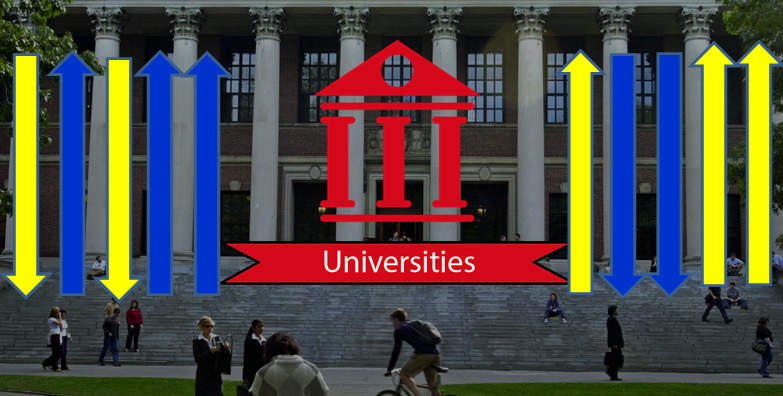Higher education has a crucial social role, a role in “nation-building”, because of which treating it on a par with winning a sprinting race or a hockey match is wrong. This is not to say that winning a race or a match is without any social significance–it can have an impact on the morale of many people in the country. But the rules by which a race or a match are governed do not have to be necessarily any different for social reasons for one country as compared to another, the way these rules for judging universities have necessarily got to be. Ranking universities across countries according to a common set of criteria, as all these rankings (such as by The Times Higher Educational Supplement ) do, amounts to detaching them from their social contexts, and hence denying the social role of education. This denial is not just an oversight. It has also an ideological function.
Consider a simple example. An Indian student must know about the impact of British colonialism on the Indian economy. A student of economics at least, therefore, must know the work of Dadabhai Naroji. But no student of economics at Cambridge, Oxford or Harvard ever gets to hear of a person called Dadabhai Naroji. Hence the trajectory of research and teaching in an Indian university must never be identical with that of a British or American university. Any common criteria for ranking universities, such as the number of publications in certain recognized journals, or the number of citations received by articles and books written by the faculty, in a world dominated by Western academia, would necessarily therefore underestimate the value of work done in Indian universities. To be worried about it is in fact to succumb to Western academic hegemony, to give up the idea that what is taught and researched in Indian universities must be rooted in the Indian social reality. …
The reason why they produce such lists based on a set of common criteria irrespective of the social context of the universities is not just ideological, not just to trap these institutions within the metropolitan conceptual discourse. There is an additional, more directly economic, reason as well. And that has to do with the fact that the era of globalization, globalized capital cannot simply carry personnel from its home country to serve its needs internationally. It must recruit local personnel, which, for capital originating in the metropolis, works out to be cheaper as well. Globalized capital, therefore, wants institutions of higher education everywhere to produce students who are more or less identical across the globe. Whom it recruits would depend upon how ‘good’ the institution in a particular country producing such students is supposed to be. It requires therefore a ranking of such institutions across the globe. Globalized capital in other words, precisely because it is globalized, requires a ranking of institutions of higher education across the world, the same way it requires a ranking of countries ” credit-rating” by specialized credit-rating agencies.
Putting Indian universities among the top so-may in such rankings, therefore, is part of the agenda of making them produce ” organic intellectuals for international finance capital”. It is to convert them from institutions charged with producing ” organic intellectuals for the Indian people” to those required to produce ” organic intellectuals for international finance capital”.
SOURCE: Suresh Babu G.S (ed). Education and the Public Sphere: Exploring the Structures of Mediation in Post-colonial India, Routledge, 2019
Prabhat Patnaik is Emiretus Professor at the Centre for Economic Studies and Planning, Jawaharlal Nehru University, New Delhi.













